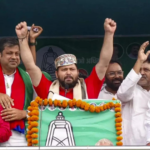Kaantha movie review: Selvamani Selvaraj’s retro-style film Kaantha goes creatively meta in the most satisfying manner while unveiling the making of a film within a film. In fact, at one point, you wonder if filmmaker Ayya (Samuthirakani) is about to get the righteous ending he always dreamt of with TK Mahadevan (Dulquer Salmaan). Unfortunately, Kaantha doesn’t seem to reach its full potential, much like some of the characters in the film.

Movie Review

Kaantha
The war of egos between a director and his protege on the set of a horror film leads to cold-blooded murder and broken hearts.
Director
Selvamani Selvaraj
Cast
Dulquer Salmaan, Samuthirakani, Bhagyashri Borse, Rana Daggubati, Ravindra Vijay
Verdict
The highs and lows of Kaantha seem starkly in contrast, much like the industry it is set in. The performances make it all worthwhile.
Kaantha story
It’s 1950s Madras. Ayya (Samuthirakani) is summoned by the head honcho of Modern Studios, Marin (Ravindra Vijay), to revive his dead horror film, Saantha. The filmmaker is pleased as he has the perfect muse to play the titular character, based on his mother, Kumari (Bhagyashri Borse). The only catch? He will have to work with his former protege, Mahadevan (Dulquer), their falling out be damned. What starts out as a tug of war between two male egos soon turns into a murder mystery, with a loved one paying the price. Inspector Phoenix (Rana Daggubati) wants to get to the bottom of it even as the two men are sure the other is at fault.
Kaantha review
Picture this. There’s a heavy downpour as a mysterious figure makes its way through a dimly lit corridor. A door slowly creaks open, and two shots are fired, with the sound slicing through the night. Even if you aren’t shown who has been shot yet, or who the perpetrator is, it creates enough intrigue in you to feel invested in Kaantha. Especially when in the next scene, Ayya tells you he’s about to make Tamil’s first horror movie based on his own traumatic experience. The story he’s telling? That of a woman who decides to take revenge on the man who wronged her.
There comes a point in Kaantha when fiction begins to bleed into reality. Ayya wants to tell the story of a man who pays the price for his betrayal. But Mahadevan wants to play to the gallery and protect his pride as a superstar. The filmmaker wants to be honest with his art, and the star wants to please the audience. Selvamani, in his bid to take the former route, ends up telling a tale that labours to make its point. Even though the penultimate scene ties this sordid tale up in a beautiful knot, the path to get there is rocky.
The mesmerising beauty of Kaantha
Everyone, from the director to the actors and the cinematography to music, leans into the theme. If you’ve seen Mahanati (2018), you know cinematographer Dani Sanchez-Lopez’s frames are nothing less than delicious. He lets you soak in everything from the picture-perfect blue sky to the Art Deco decor in light-hearted scenes, and plays with mirrors and light in scenes that require Mahadevan to do some soul-searching. While Jhanu Chanthar’s songs don’t always leave an impression, Jakes Bejoy’s score certainly does. The film is a beauty to watch when the story (co-written by Tamizh Prabha) stays true to its retro roots.
Dulquer delivers one of his career-best performances as the superstar Mahadevan. His clean-shaven look in a white shirt and mundu will remind you of many a yesteryear superstar. He also dives deep into the retro acting style, which requires him to deliver a full-body performance. One scene where he’s tasked with showing multiple emotions in a matter of seconds shows Dulquer’s range as an actor. As does a scene where he confronts his mentor in heartbreak to understand why they’ve grown apart. Samuthirakani shines effortlessly as a father-like figure to both Mahadevan and Kumari. Bhagyashri is doe-eyed brilliance, with her acting and role both serving as the emotional anchor.
When Kaantha begins to falter
Kaantha takes its own sweet time setting up the years-long feud between Mahadevan and Ayya, which we learn through Kumari’s eyes. But you don’t mind that, given how pivotal it is to the story. However, as the layers are peeled back, the film begins to lose steam. There’s a murder struggling to take centre stage and overtake Mahadevan and Ayya’s ego war, and the manner in which it is solved by Phoenix seems lackadaisical at best.
Much like the characters he’s critiquing, Selvamani forgets to lend depth to the cold-blooded murder. It also doesn’t help that Rana and his character stick out like a sore thumb in this world, with everything from his dialogue to pacing once he steps into the fold and wisecracks not blending in seamlessly. The only time Phoenix’s character seems to fit is when he tells the murderer, “Aha! I know you did it,” like a character out of a detective novel.
In conclusion
Kaantha, much like the film industry it is set in, has much to offer in terms of dizzying fame, passionate affairs and unchecked ego. However, the highs and lows of the film seem starkly in contrast, also much like the industry it is set in. It’s the performances that make the uneven tone of the film worthwhile.












